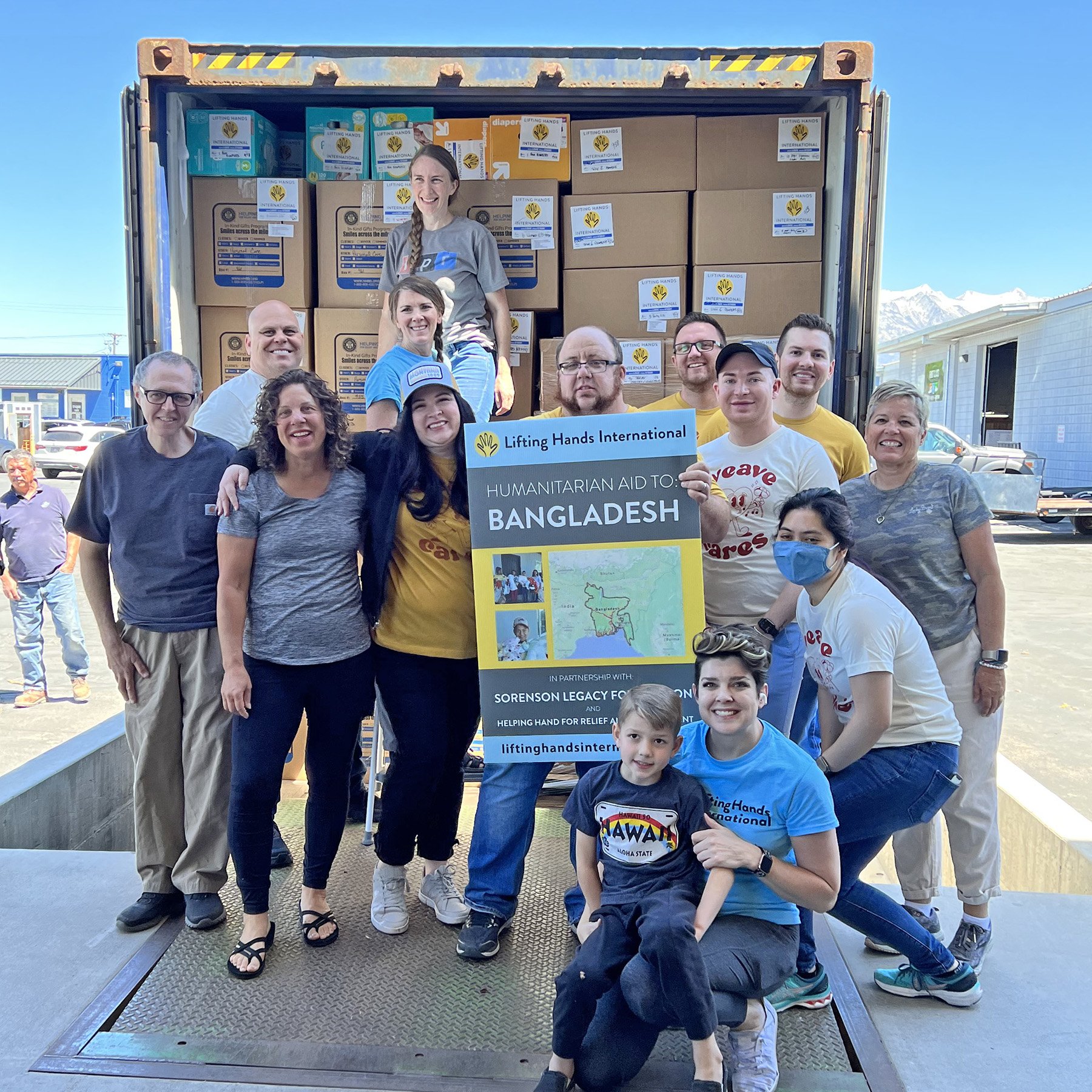by Brigid Rowlings, LHI Communications Director
LHI sends shipments of humanitarian aid from our warehouse in Utah to Bangladesh every year.
Have you noticed that Gaza, which is entering its fourth month of bombardment, or Ukraine, which is approaching its two-year anniversary of Russia’s invasion, are no longer as prominent in the news as they once were? Why? Even when humanitarian crises remain, the news cycle moves on.
This is one of the challenging aspects of humanitarian work. Media focus on events like the war in Ukraine, the earthquakes in Turkey and Syria, and the humanitarian crisis in Gaza catch our collective attention and prompt us to look for ways to help. But, when the news moves on, often, so do the donations to organizations like LHI.
LHI founder and director Hayley Smith visited a Rohingya refugee camp in Bangladesh in 2017.
Journalist Femi Oke recently spoke about this challenge on the NPR news show Here and Now. Her interviews with Rohingya refugees who’d lived in Bangladesh for 30 years revealed the fear of many long-term refugees: the world is forgetting about them. For people who depend almost entirely on humanitarian aid organizations and their donors for necessities like food, water, clothing and shelter, this thought is scary. But, with the global population of long-term refugees rising, the need for humanitarian assistance that leads to self-sufficiency is greater than ever.
While LHI is always poised to meet urgent needs, we have and continue to expand programs that facilitate increased stability and self-sufficiency for refugees along each stage of the refugee journey. These programs include:
Women at the LHI Community Center in Serres, Greece learn to cut hair. This is a skill the women can use to support themselves and their families when their asylum cases are processed and they are resettled in a new country.
Workforce training and income opportunities
From the language classes and barber trainings that take place at our community center in Serres, Greece to the food-packaging business and aesthetician training happening at the LHI Shelter in Lviv, Ukraine, LHI facilitates programs that prepare refugees for employment in the communities they live in or will resettle in. Our livestock program gives milk goats to Syrian refugees in Jordan who are then able to support their families from the sale of milk and milk products. And, we have a new community center in Lviv, Ukraine that offers an entrepreneurial accelerator program to internally displaced women, most of whom are single mothers because their husbands have been deployed or they’ve been widowed by the war.
Teams of mobile psychologists visit de-occupied villages in Ukraine and lead group therapy sessions for children and adults.
Social-emotional supports
In our programs in Greece, Moldova, and Ukraine, teams provide social emotional support such as sessions with psychologists, yoga classes, and art therapy for people who have experienced the trauma of leaving home behind for an uncertain future. In emergency situations like the earthquakes that hit Turkey in February 2023 and the ongoing crisis in Gaza, we’ve provided mobile psychological support for survivors and aid workers. These programs help refugees begin to heal and have hope for the future.
LHI’s Welcome Program volunteers add special touches to the apartments they set up for refugee families resettling in Utah.
Community Integration
Our Welcome Program alleviates the strain that refugees resettled in Utah feel by providing all of the items on the US resettlement agency’s checklist for homes for new arrivals. This means that refugee families will not have to buy them with the small stipend they receive. But the LHI Welcome team doesn’t just stop at the basic requirements! Our volunteers make up beds with handmade quilts and blankets, bring school supplies, clothing and toys for children, and always leave warm messages of love, support and welcome for families.
While LHI remains ready to help in emergency situations, helping refugees achieve self-sufficiency and “the good life” is one of LHI’s main priorities. We depend on the support of LHI2G, our team of recurring donors, for a reliable source of funding to keep these programs going. Consider joining the team! No recurring monthly donation is too small. Plus, you will get access to a special behind-the-scenes newsletter exclusively for LHI2G members. Visit our LHI2G page to learn more!





